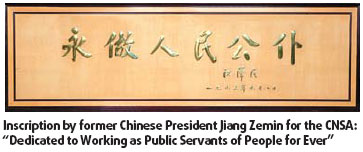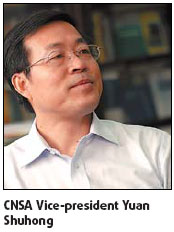CEPA aims to build service-oriented gov't

The four-year China-Europe Public Administration Program (CEPA), launched in 2003 and scheduled to come to a close at the end of 2007, has greatly benefited the Chinese government in terms of public administration and public management, said Yuan Shuhong, vice president of the Chinese National School of Administration (CNSA).
"The program is the largest between China and the European Union (EU) in terms of public administration," said Yuan. "And its main feature is the annual China-Europe Senior Forum on Government Management."

First held in June 2004, each year the forum addresses a main theme that is current, relevant and important in the continuing development of public administration in China.
The first forum was of particular importance for the development of public administration in China, because it "helped build a service-oriented government," said Yuan.
Entitled "Innovation in Public Service in China and Europe", the forum was believed to have been the first to introduce the concept of "public administration" to many Chinese officials.
The most important consensus reached at this forum stated that "public administration is the main function of a government" and "the government should gradually increase its investment in public administration innovation".
"Premier Wen Jiabao noted in the 2006 Government Work Report that China should build a service-oriented government, while the report recently concluded 17th National Congress of the Communist Party of China (NCCPC) also reiterated that point," noted Yuan.
"And CNSA has played a constructive role in the process."
The two forums that followed in 2005 and 2006 also made their own contributions to the development of the Chinese government, with the 2005 forum focusing on "perspectives on good governance" and next one highlighting "innovation in public management".
"The theme of this year's forum, which will kick off today will be 'Public Sector Reform and the Improvement of Government Performance'," said Yuan. "It coincides with the deployment mapped out by the 17th NCCPC for the coming years. So it is timely and necessary for us to hold such a forum."
The 2007 forum will address issues such as the main objectives of public sector reform, whether greater efficiency has been achieved, whether the administration has become more service-oriented, and if that has increased both transparency and confidence in the administration.
The forum has created an established platform of dialogue and exchange for officials and experts, Yuan pointed out. "So far, over 1,000 officials from Europe and China have participated in the forums, including many high-ranking EU officials."
"As for the Chinese side, State Councilor, Secretary-general of State Council and CNSA President Hua Jianmin addresses the forum every year, accompanied by many ministerial-level officials. The Chinese government has attached great importance to it."
Yuan also noted that the administrative system of a country must adapt to domestic conditions.
"Administration management is a science that has its own regulations. Since the 1970s, many useful scientific experiences have been accumulated during reformation around the globe."
"We should use them for reference, but we cannot just borrow them without analysis. We have to bear in mind the situation of our country," he said.
Assessment system
Apart from hosting the forum, CNSA is also training civil servants under the program, and has devised a government performance assessment system to meet the current needs of Chinese authorities.
"Besides, we have established a communication network linking our school with the EU authorities and local governments in that region," added Yuan, "And they are very effective".
"Through continuous efforts over four years, the training ability of our school has been greatly improved. It has also benefited our public administration study and consultancy. We have made a significant move and laid a very solid foundation for the next step of the project," he added.
The program will continue with financial assistance from the EU. "The second phase will probably start in 2009, with an operating period of four to five years. As for the forum, we intend to maintain it as an regular event, so as to provide a platform for the two sides to communicate on contentious and hot issues."
(China Daily 11/13/2007 page19)














